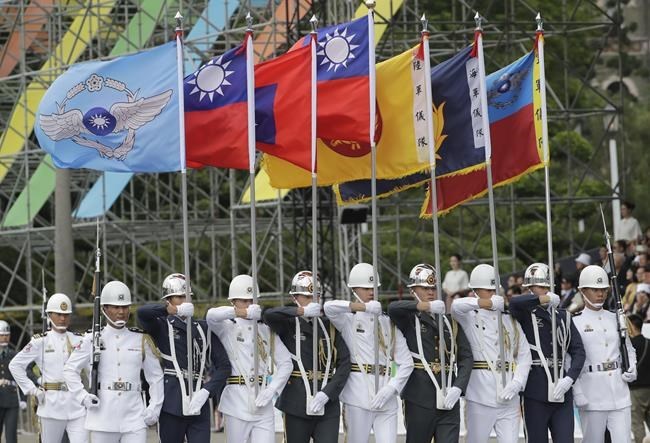TAIPEI, Taiwan (AP) ŌĆö TaiwanŌĆÖs new president, Lai Ching-te, said in his inauguration speech Monday that he wants peace with China and urged it to stop its military threats and intimidation of the self-governed island that Beijing claims as its own territory.
ŌĆ£I hope that China will face the reality of (Taiwan)ŌĆÖs existence, respect the choices of the people of Taiwan, and in good faith, choose dialogue over confrontation,ŌĆØ Lai said after ąĪ└Č╩ėŲĄ sworn into office.
Lai pledged to ŌĆ£neither yield nor provokeŌĆØ Beijing and said he sought peace in relations with China. But he emphasized the island democracy is determined to defend itself ŌĆ£in the face of the many threats and attempts at infiltration from China.ŌĆØ
LaiŌĆÖs party, the Democratic Progressive Party, doesnŌĆÖt seek independence from China but maintains that Taiwan is already a sovereign nation.
The Chinese office in charge of Taiwan affairs criticized LaiŌĆÖs inauguration speech as promoting ŌĆ£the fallacy of separatism,ŌĆØ inciting confrontation and relying on foreign forces to seek independence.
ŌĆ£We will never tolerate or condone any form of ŌĆśTaiwan independenceŌĆÖ separatist activities,ŌĆØ said Chen Binhua, spokesperson of the Taiwan Affairs Office of ChinaŌĆÖs State Council.
ŌĆ£No matter how the situation on the island changes, no matter who is in power, it cannot change the fact that both sides of the Taiwan Strait belong to one China ... and cannot stop the historical trend of the motherlandŌĆÖs eventual reunification,ŌĆØ Chen said.
The Chinese Ministry of Commerce on Monday also announced .
Lai, 64, takes over from Tsai Ing-wen, who led Taiwan through eight years of economic and social development despite the COVID-19 pandemic and ChinaŌĆÖs escalating military threats. Beijing views Taiwan as a renegade province and has been upping its threats to annex it by force if necessary.
Lai is seen as inheriting Tsai's progressive policies, including universal health care, backing for higher education and support for minority groups, including making Taiwan the first place in Asia to recognize same-sex marriages.
In his inauguration speech, Lai pledged to bolster TaiwanŌĆÖs social safety net and help the island advance in fields such as artificial intelligence and green energy.
Lai, who was vice president during TsaiŌĆÖs second term, came across as more of a firebrand earlier in his career. In 2017, he described himself as a ŌĆ£pragmatic worker for TaiwanŌĆÖs independence,ŌĆØ drawing BeijingŌĆÖs rebuke. He has since softened his stance and now and the possibility of talks with Beijing.
Thousands of people gathered in front of the Presidential Office Building in Taipei for the inauguration ąĪ└Č╩ėŲĄ. Donning white celebratory hats, they watched the swearing-in on large screens, followed by a military march and colorful performances featuring folk dancers, opera performers and rappers. Military helicopters flew in formation, carrying Taiwan's flag.
Lai accepted congratulations from fellow politicians and delegations from the 12 nations that maintain official diplomatic relations with Taiwan, as well as politicians from the U.S., Japan and various European states.
Lai, also known by his English name William, has vowed to continue his predecessorŌĆÖs push to maintain stability with China while beefing up TaiwanŌĆÖs security through imports of military equipment from close partner the U.S., the expansion of the defense industry with the manufacture of submarines and aircraft, and the reinforcing of regional partnerships with such as the U.S., Japan, ąĪ└Č╩ėŲĄ Korea and the Philippines.
U.S. Secretary of State Antony J. Blinken congratulated Lai on his inauguration. ŌĆ£We look forward to working with President Lai and across TaiwanŌĆÖs political spectrum to advance our shared interests and values, deepen our longstanding unofficial relationship, and maintain peace and stability across the Taiwan Strait,ŌĆØ Blinken said in a statement from his office.
The U.S. doesnŌĆÖt formally recognize Taiwan as a country but .
LaiŌĆÖs relatively conciliatory tone will come across as reassuring to foreign governments that may have been concerned about his past reputation as a firebrand, said Danny Russell, vice president of the Asia Society Policy Institute.
ŌĆ£There is virtually nothing that Lai could have said, short of ŌĆśunconditional surrender,ŌĆÖ that would satisfy Beijing,ŌĆØ he said.
Although Lai signaled he would maintain the overall direction of Tsai's policy regarding Beijing, he struck a more sovereignty-affirming tone in his speech, said Amanda Hsiao, a senior analyst with the International Crisis Group.
ŌĆ£This likely fits within Beijing's low expectations of Lai, so it won't necessarily change their response,ŌĆØ Hsiao said. ŌĆ£China was always going to respond negatively to Lai.ŌĆØ
During her tenure, Tsai and . She also kickstarted a military modernization drive.
TsaiŌĆÖs leadership during the pandemic split public opinion, with most admiring TaiwanŌĆÖs initial ability to keep the virus largely outside its borders but .
___
Follow AP's Asia-Pacific coverage at
Simina Mistreanu And Christopher Bodeen, The Associated Press




